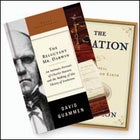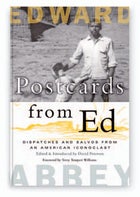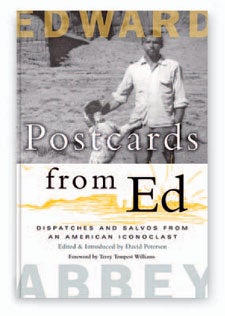OVER THE PAST TWO YEARS, biologist Edward O. Wilson and ║┌┴¤│ď╣¤═° editor at large David Quammen have been two of the most visible defenders of science in the battle over intelligent design┬Śthe idea that the complexity of life on earth could not have arisen without a divine director, i.e., God. United States District Judge John Jones struck down the teaching of intelligent design in public schools in a landmark ruling last December┬Śdeclaring it religious creationism cloaked in scientific language┬Śbut that hasn’t stopped Quammen and Wilson from continuing to press their case, each with a refreshingly concise and accessible new book on the fact of evolution by natural selection.
The Reluctant Mr. Darwin and The Creation
 The Reluctant Mr. Darwin
The Reluctant Mr. DarwinPostcards from Ed
 Postcards from Ed: Dispatches and Salvos from an American Iconoclast
Postcards from Ed: Dispatches and Salvos from an American IconoclastIn The Reluctant Mr. Darwin: An Intimate Portrait of Charles Darwin and the Making of His Theory of Evolution (W.W. Norton, $23), Quammen distills the story of the British naturalist and the formation of his world-shaking theory in an engaging story that’s part biography, part essay. Quammen’s starting point is 1837, the year after Darwin returned from his voyage on the Beagle, when he was just beginning to believe that species┬Śincluding humans┬Śevolve as they adapt to changes in their environments. The thought was unsettling even to Darwin; science was still tightly bound to religion, with creationism the reigning belief of the day. Yet after combining additional fieldwork with library research and data from other naturalists, he was forced to admit that he was on to something. Instead of publishing, Darwin sat on his radical new theory for 20 years. Finally, panicked by the realization that a rival was about to steal his thunder, he produced his 1859 masterwork, The Origin of Species, in ten months of furious scribbling. “Holding it in his hands,” Quammen writes, “he felt an irresistible flush of satisfaction, his private reward between the anguish of creation and the anguish that would come with the book’s reception.” In Darwin’s autobiography, Quammen notes, the aging naturalist wrote with confidence that the idea of divine design had been put to rest. That, of course, was hardly the case.
If Quammen’s book can be read as a rebuke to the intelligent-designers (it’s as if he’s thrusting Darwin in front of them and saying, These are the facts┬Śdeal with them!), Wilson’s The Creation: An Appeal to Save Life on Earth (W.W. Norton, $22) is a conciliatory effort to find common ground. Structured as an open letter to an imagined Southern Baptist preacher, the book argues against the validity of creationism, while at the same time inviting evangelical Christians to join biologists in an effort to save the earth. “Pastor, we need your help,” pleads Wilson, a native Alabaman who was raised a Southern Baptist. “The Creation┬Śliving Nature┬Śis in deep trouble.” Writing in a warm, open voice, Wilson provides a litany of reasons to slow, stop, and reverse the planet’s precipitous decline in biodiversity. These reasons will be familiar to anyone engaged in the environmental debate┬Śeverything from the spiritual value of wilderness to the importance of species diversity in the search for new medical drugs┬Śbut Wilson wraps them up in an unthreatening package. “If religion and science could be united on the common ground of biological conservation,” he writes, “the problem would soon be solved.” That might be stretching things a bit, but at least it’s a start.
Best Regards and Carry On
When he wasn’t writing novels, exploring the wilderness, or conspiring to blow up dams, Edward Abbey was firing off letters. At least that’s what we’ve concluded after an indulgent afternoon spent with
Postcards from Ed: Dispatches and Salvos from an American Iconoclast
(Milkweed Editions, $25), a collection of more than 150 of Cactus Ed’s unpublished letters┬Śthe most satisfying being his rambling, prodding missives to writers like Edward Hoagland, Annie Dillard, and, in this case, Livingston, Montana┬ľbased Thomas McGuane.
“Dear Tom, Can’t blame you for getting mad: nobody likes to be smoked out of his hole in the middle of February. But when did I ever accuse you of ‘loving’ the West? I was merely suggesting, in my discreet and subtle way, that if you’re gonna make a home out here, you might be interested in helping to protect your own home (for crissake!) from all those eastern and mid-western relatives of yours who want to flood you out or strip mine you or radiate you or smother you w/ smog etc. Passive non-resistance will get you nothing. ‘Westerners’ like that are no better, in my eyes, than common tourists. Or worse: like ticks on a dog, ornamental but dysfunctional. Or as my neighbor Joe McKeanry says (he’s a mining engineer), ‘useless as tits on a motor.'” [March 5, 1982]


